
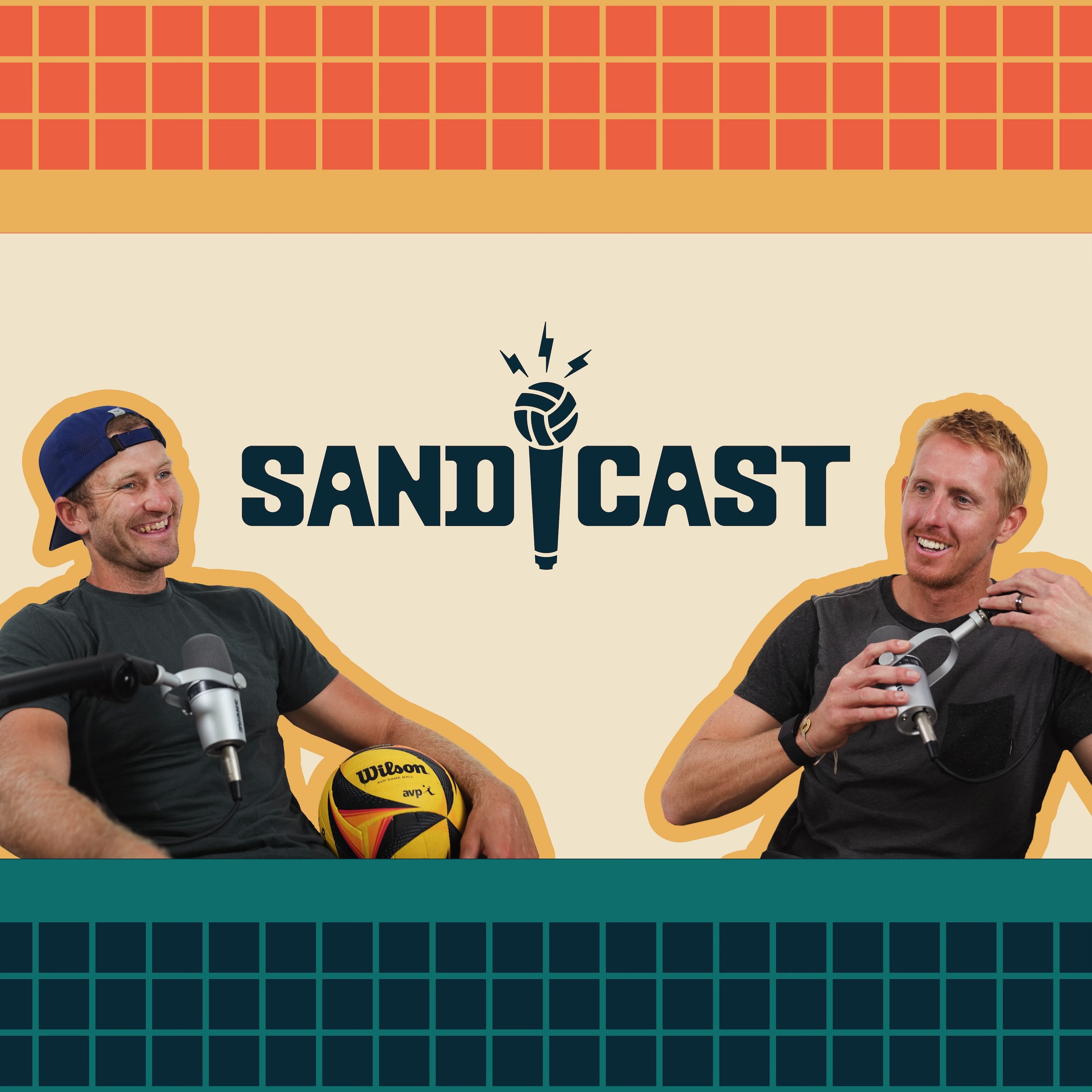
1.1M
Downloads
487
Episodes
SANDCAST is the first and leading beach volleyball podcast in the world. Hosts Tri Bourne and Travis Mewhirter take listeners into the world of the AVP, Volleyball World Beach Pro Tour and any other professional beach volleyball outlets, digging deep into the lives of the players both on and off the court as well as all of the top influencers in the game.
Episodes
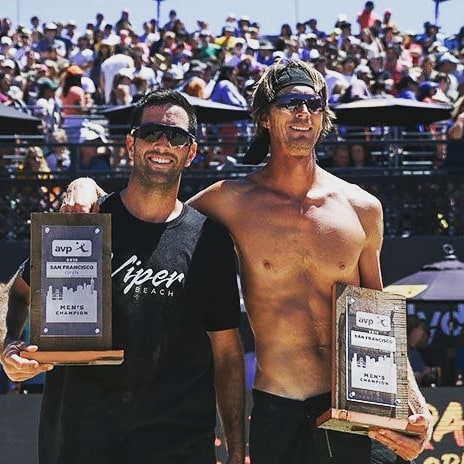
Wednesday Jul 25, 2018
Rafu Rodriguez-Bertran: Winning weird in semi-retirement
Wednesday Jul 25, 2018
Wednesday Jul 25, 2018
Rafu Rodriguez-Bertran was not supposed to win an AVP this year. Heck, he wasn’t even sure if he’d play an AVP this year.
This past winter, he had a son, Nico, his first child. His club in Temecula, Viper Volleyball, was growing and taking off. He’d had an excellent career, one that took him as high as the 2015 World Championships.
It was time for a shift in priorities.
He told this to his partner, Piotr Marciniak, who nodded and went to Ty Loomis for Austin. Rafu sat out.
And then beach volleyball happened. Partners changed. Eric Zaun moved from Ed Ratledge to Tim Bomgren, leaving Ratledge without a partner.
Which brings us to another point: Ed Ratledge was not supposed to win an AVP this year.
He’s 41, been trying for 18 years. Dumped by the partner with whom he’d had his most career success, Ratledge, it seemed, was on his way out, no different than Rafu. Like Rafu’s club, Rateldge’s business, VolleyOC, was constantly expanding.
And so the most wonderful band, one quasi-retired, one sort of reprioritizing, was formed.
“It’s sort of stepping out, kind of doing it part-time slash full-time,” Rafu said on SANDCAST: Beach Volleyball with Tri Bourne and Travis Mewhirter. “I have some other stuff to do but I still want to train and I still want to compete because In like competing but for sure, I never had it in my mind that I would be in that final. Ed is the same way: he loves playing. We do it for fun because that’s what we want to do. That takes away all of the pressure.”
So what did their pre-semifinal routine look like? What was the master strategy to toppling Billy Allen and Ryan Doherty and then Sean Rosenthal and Chase Budinger?
What was the key to unlocking 18 years of championship buildup for Ratledge?
“It’s like, ‘Let’s just go out and play.’ We didn’t even have a strategy going into the semifinals,” Rafu said, laughing when saying it aloud, as if it just occurred to him how outrageous that is. “[Sunday] morning he was on the phone, setting up his tournaments back home, on the phone, and then we skateboard down to the site and ‘Hey, let’s just play!’ It worked out. I don’t know why. No pressure. Just play. It’s so fun because there’s never a single drop of pressure between us.”
They play free and weird, and in this world, weird is the most supreme of compliments. Ratledge’s dialogue with the fans is one of a kind, and his arm swing, coined the “wet noodle” by Tri Bourne and Trevor Crabb on the New York livestream a year ago, is the most frustrating swing on tour, one that doesn’t bring a tremendous amount of pace but was, by tournament’s end, the most effective of any player in San Francisco.
“And,” Rafu added, “he optioned at least 50 percent of balls I passed.”
Unconventional. Weird. Quirky. From the dialogue to how they’ve both taken half-steps back in order to achieve their career bests.
But really, is there any other way it could have gone?
“It’s kind of crazy, all the messages and all the people that are interested and are aware of what’s going on and watching,” Rafu said. “It’s pretty fun, it’s pretty cool to have all that support. Even when you don’t know there’s not many people watching you. It’s cool.”
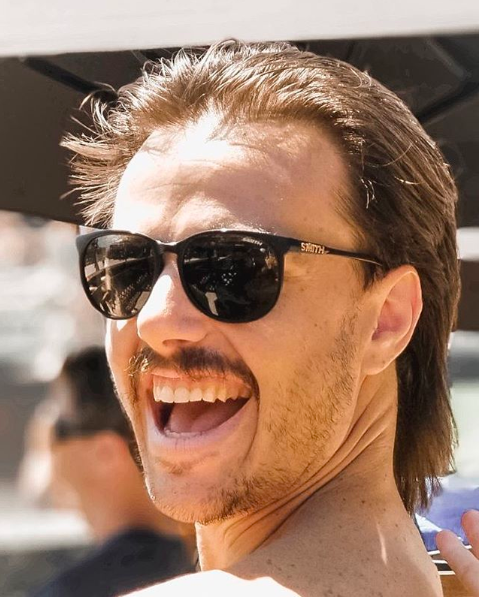
Wednesday Jul 18, 2018
Suckin' down Lobes and sharing sarcasm with Brian Cook
Wednesday Jul 18, 2018
Wednesday Jul 18, 2018
In December of 2017, the AVP made a landmark announcement: It would be partnering with Amazon Prime for the upcoming season, and several seasons after that. The partnership would include a much-improved livestream experience, with viewers able to watch on one of the most rapidly growing platforms, with a professional announcing team and a camera crew and interviews and features and everything one might expect when an athletic league teams up with one of the country’s most popular businesses.
It was a widely lauded move, and it has since been met with enthusiasm and approval -- and the occasional critique, an inevitable side effect of launching a new platform -- from the beach fans that be.
Yet here’s what hasn’t been announced in any official capacity, since the individual in question does not operate under any official capacity anyway: the launching of Brian Cook’s wildly popular Instagram stories, in which he follows and posts about the AVP from his apartment in Manhattan Beach, creating a character that is at once overtly sarcastic and deeply knowledgeable, hilarious yet also sort of correct in his analysis, and the best brand ambassador Michelob Ultra never knew it wanted.
“The whole thing started with the first tournament in Austin,” said Cook, who isn’t playing because of a series of surgeries required after years of playing indoor in college at Stanford and overseas in Italy and Greece. “I was just watching the livestream, and that one was kind of a negative story, it wasn’t the nicest story, but I had no bad intentions and still don’t have any bad intentions for anyone. But I gained a little following because a lot of people were frustrated with the Amazon Prime stream. It was their first time, it was understandable, and I just wanted to let them know – look, you gotta make it a little better.”
And, uh, you know, he had just undergone hip surgery, so “I was also on a lot of Percocet and was a lot more vocal.”
Indeed, the sarcasm, and brutal honesty, is strong with this one.
It has become something of a phenomenon, though. At most AVP events, a good number of the players closely follow Cook’s stories, some of which contain legitimate, if not barbed, feedback… and some of which just contain hysterical, mostly nonsensical posts about Michelob Ultra.
He’s here to make you laugh. And he’s very good at it – so long as you don’t take him too seriously. And besides, he doesn’t mean most of what he says. Like all jokes, only a kernel of it is true, the rest is exaggeration, entertainment for the masses.
“Let’s give [Amazon Prime] some credit: What they’re doing is hard,” said Cook, whose sister, Karissa, made the semifinals with Katie Spieler in Austin. “They’re going eight-hour days on stream? That’s insane. That’s really hard. But when you’re watching every single second of the coverage, you’re going to catch some bloopers, and I’ve documented them.”
And it’s not only Amazon that is on the receiving end of Cook’s jokes. He pokes fun at April Ross and Alix Klineman, who hug between each point, whether it’s an error or an ace.
“I’m all about Team Hugs,” he said. “They’re great sports about me counting how many times they hug. In two matches I think they eclipsed 300. It’s exciting if you’re not at the event. You can definitely catch the livestream and count the hugs yourself.”
Sometimes the jokes go well. Sometimes, as it goes in comedy, they don’t.
Cook couldn’t resist the opportunity to lean into Reid Priddy’s struggles at the score freeze, posting a picture of a frozen man stuck in a freeze.
“Little did I know he’d get a little mad,” Cook said, “and block me on Instagram.”
He said this after acknowledging that Priddy has long been one of Cook’s idols, someone he looked up to throughout his prolific indoor career.
“He’s one of the best players of all time,” Cook said.
Sometimes sarcasm gets you laughs. Sometimes it gets you blocked on Instagram.
In any event: Cook has picked up quite the following from his satirical stories, a fun way to bide his time while he recovers from surgery before he can get back out on the beach himself.
In the meantime, "There is,” he said, “an absolute revolution going on.”
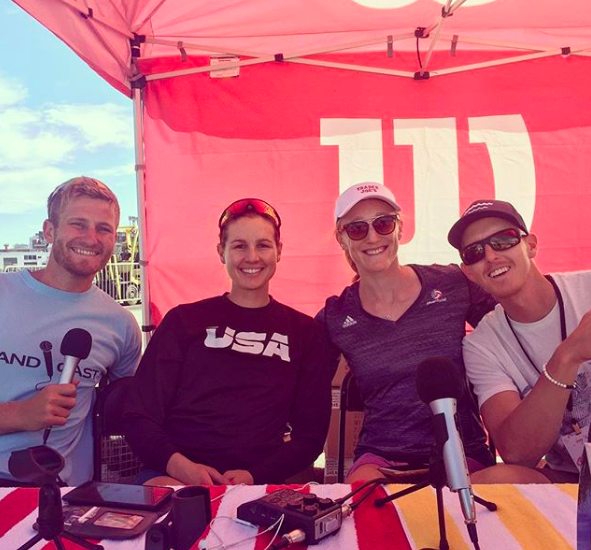
Wednesday Jul 11, 2018
Emily Day and Betsi Flint: Weekend warriors
Wednesday Jul 11, 2018
Wednesday Jul 11, 2018
It was a look that featured a strange blend of joy and exhaustion, one athletes know all too well. Emily Day and Betsi Flint had just wrapped up their first day at AVP San Francisco, playing the maximum number of sets (six), two of those going into extra points.
Worse yet, they had lost their second match of the day, relegating them to the contender’s bracket, portending a long grinder of a road ahead if they were to make the finals in San Francisco and defend the Seattle title they earned two weeks before.
And oh, they were only getting started.
Before they would cap the weekend with another AVP title in San Francisco, finishing with a 21-17, 16-21, 15-7 win over Geena Urango and Caitlin Ledoux, before they would play 16 sets in three days, before they would win their second title in as many AVPs, they had a plane to catch.
“We went straight from Seattle,” said Flint, who alongside Day beat April Ross and Ledoux in the finals 19-21, 21-19, 18-16, “just jumped in the lake and hopped on a plane to Poland, where we had to qualify on Wednesday.”
And they did, winning both matches, the second, of course, going to three. They “came out flat,” Flint said, in the main draw, losing to Agatha and Duda in the first match and another pair of Brazilians, Josemari Alves and Liliane Maestrini in the second.
Not that they had much time to wallow and recover, for it was straight to San Francisco.
“We definitely have to stay hydrated,” Day said. “That flight to Poland was pretty rough. I may have cramped in the airport changing room. But that’s what we want to do. We want to play every weekend and so we’re out there to play every weekend. We’ll do whatever.”
So they do what every over-traveled, underslept, exhausted athlete does: They convinced themselves they were fine.
“It’s interesting because you think you feel ok,” Day said. “You talk yourself into it, like ‘I feel good, blah blah blah, I came off a win,’ then you get on the court and it’s like ‘Oh, God, don’t feel as good as I thought.’ But mentally we know that every team is good on the world stage so we just need to take it point by point, but winning Seattle gave us confidence. We actually had a huge comeback to qualify for Poland. We might have been down 8-2 in Poland and we came back to win 15-12. Not sure if that’s ever going to happen again but we took it and ran with it.”
Evidently so.
They took it and ran with it all the way back to San Francisco, coming back – again – in the contender’s bracket, rallying from a first-set loss to Lara Dykstra and Sheila Shaw to win 20-22, 23-2, 15-12. A win and a forfeit later, they were in the semifinals, rematched with the team that put them in the contender’s in the first place: Brittany Howard and Kelly Reeves.
They won, 21-14, 21-13.
A finals rematch with Ledoux awaited, and again, it went – and how could it not? – to three sets, where Day and Flint prevailed, 15-7.
Three weeks, three tournaments, 16 matches, 37 sets, two AVP wins, one FIVB qualification. Standard month for Day and Flint.
“Qualifying is an awesome accomplishment and not something we ever take for granted,” Day said.
But it’s pretty special winning an AVP and getting the champagne, family and friends. Just trying to win.”
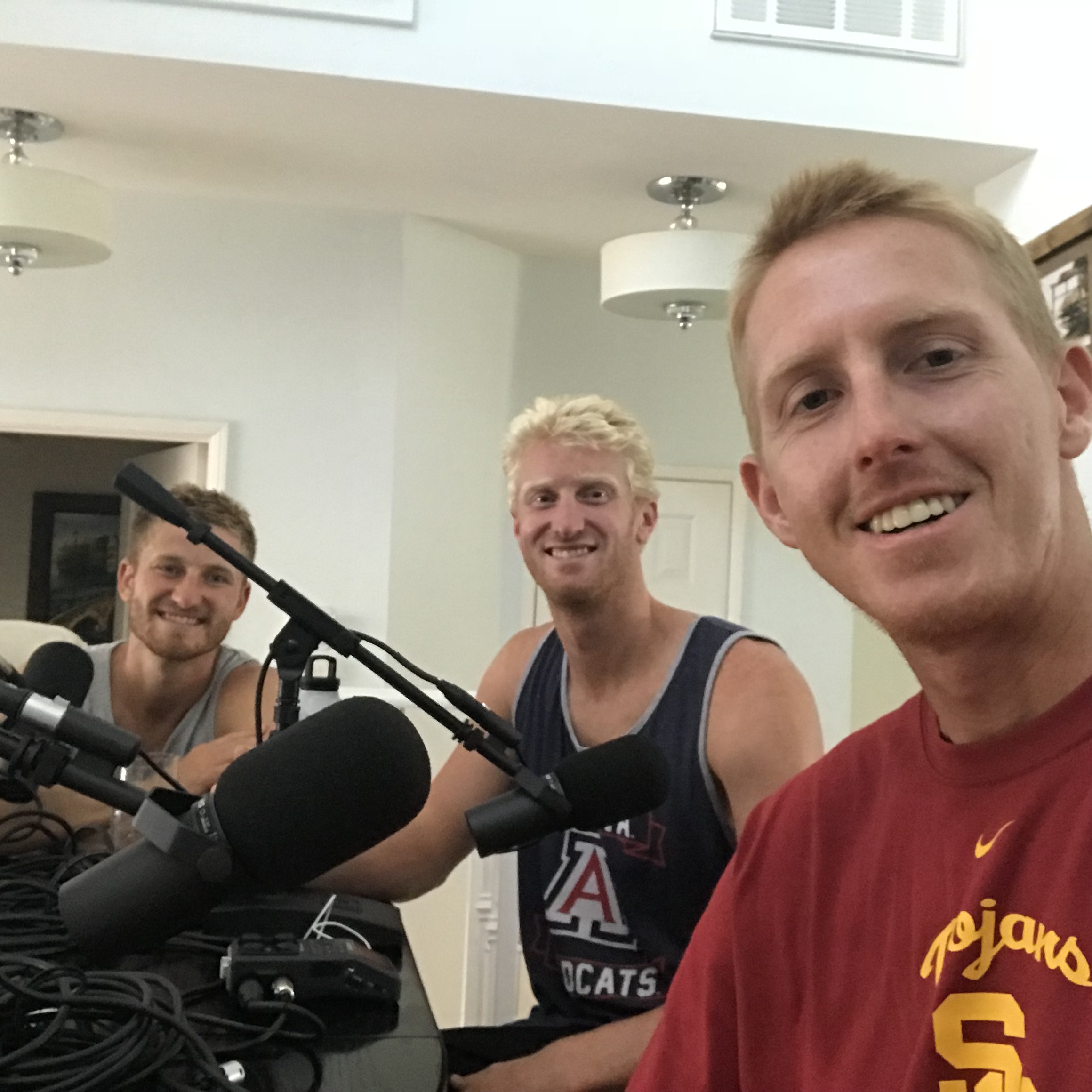
Wednesday Jul 04, 2018
Chase Budinger: Dunking over P Diddy to bouncing on the AVP
Wednesday Jul 04, 2018
Wednesday Jul 04, 2018
Oh, God. It was happening again.
Chase Budinger had felt this before. He’d felt these nerves, that extra surge – no, surge might not do it justice, the extra deluge – of adrenaline. He knew what happened the last time. And here it was, all over again.
His first point as a professional beach volleyball player, partnered with one of the all-time greats in Sean Rosenthal, matched up with the hottest team in the world in Alexander Brouwer and Robert Meeuwsen, set on stadium court of the biggest domestic tournament of the year, was a swing into the net. Then another. Then another in which he got stuck in the sand, to the point that the guy who was once in an NBA Dunk Contest couldn’t get his feet off the ground.
“I don’t think that’s ever happened to me in practice,” Budinger said. “And in that game, it happened to me twice.”
This type of debut might scar some. Budinger? Not really. He’d been here before. On a bigger stage, with more viewers, higher stakes.
In his first game with the Houston Rockets, who had traded for Budinger after he was drafted by the Detroit Pistons with the 44th pick of the 2009 NBA Draft, he had two straight turnovers and an airball.
“I get taken out right away, and I’m like ‘Wow, that was embarrassing, there’s no way he’s going to put me back in,’” Budinger recalled. “And he actually does put me back in in the second half and I finally got a fastbreak layup and I remember after I got that layup my nerves just kind of flushed.”
Then he hit a jump shot, put down a dunk, finished with six points in 15 minutes. A quick recovery after an inauspicious start.
So yes, Budinger had been there before when he struggled in that opening match against Brouwer and Meeuwsen. He knew, just as Rosenthal did, that it would take time, that his body would soon learn to not freak out prior to a match, that the adrenaline drip would be a bit less intense.
That he’d be just fine.
And he would be.
A week later, he and Rosenthal would travel to Lucerne, Switzerland, seeded No. 28 in the qualifier. They mopped up two qualifying matches in straight sets, and promptly upset the No. 1 team in the tournament, Switzerland’s Nico Beeler and Marco Krattiger, in consecutive sets as well.
“I never had that moment where the nerves went away,” Budinger said. “It just went away over time. Winning those games definitely helped with the confidence.”
With each tournament, the wins mounted, and the confidence seemed to subsequently bloom. In New York, for the second AVP of the season, Budinger helped Rosenthal knock out his old partner, Trevor Crabb, and John Mayer. Then he toppled Olympian Casey Patterson and Stafford Slick before succumbing to John Hyden and Theo Brunner, finishing fifth.
In just two tournaments, Budinger had eclipsed the best finish of his older brother, Duncan, who has been playing in AVPs since 2005.
Ah, yes, Chase’s older brother plays professionally, too. As does his sister, Brittanie, the only volleyball player in University of San Francisco history to have her number retired. Funny story about that, too.
When Budinger was still in the NBA, he had a practice at the University of San Francisco, and there, at the top of the rafters, was a jersey with the last name Budinger on it. His teammates looked up, laughed, wondered what the heck that was all about, and Chase just shrugged.
Yep, his family can ball.
So competitive were the Budingers that Duncan and Chase were barred from playing one-on-one basketball. Even board games were nixed.
Such are the compromises a family must make when all three children reach the top levels in their respective sport, and in Chase’s case, sports is plural.
He has a long way to go. He knows that. The Olympics are a goal, yes, but right now the focus is on fine-tuning – subtle nuances of blocking, setting, passing, siding out more consistently.
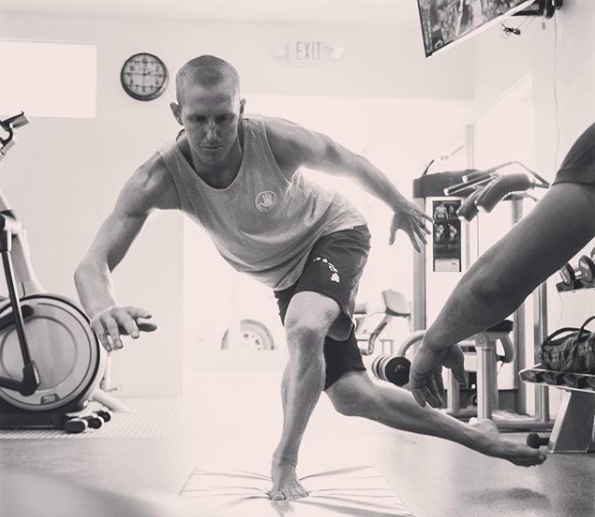
Sunday Jul 01, 2018
Tri Bourne: I'm not back yet, but the warm up has begun
Sunday Jul 01, 2018
Sunday Jul 01, 2018
I’m not exactly back, BUT things are finally getting interesting for me!
I’ve been touching the ball and hitting the gym for a few weeks now and mentally it feels amazing. Physically, it hurts so good.
My health is not totally under control but things seem promising. Can your health ever be totally under control?
Despite being asked [rightly so] almost daily about when l’ll come back and who I’ll be playing with by fans and peers, over the last year or so I did my best to not think about what the future might hold for me in the beach volleyball arena. Now that I'm feeling better and getting my health under control, I’ve finally allowed myself to start thinking about what kind of future I want to manifest for myself for [the beginning of] the rest of my career.
I’ve been enjoying watching NBA free agency because I feel like I can relate those athletes who have to decide where to play and what contracts to take. It’s exciting, yet stressful… I wish I had their “$$ problems". ;)
As of right now there are still quite a few unknowns, but I've recently learned to embrace the challenges that the unknown brings to my life.
A quote that has stuck with me over the last few months is, “The best way to know the future is to create it.” - Honest Abe.
So despite currently not knowing whether I’ll for sure be ready to play, I signed up for the Moscow and Vienna FIVBs after realizing that in order to even have an opportunity to play I had to sign up 37 days in advance.
So there’s a possibility that I play this season… As far as the domestic tour, I don't know what my plans are yet. Luckily they don't make you sign up over a month in advance.
Anyway, listen in to the podcast for updates on my status… Shoots then!
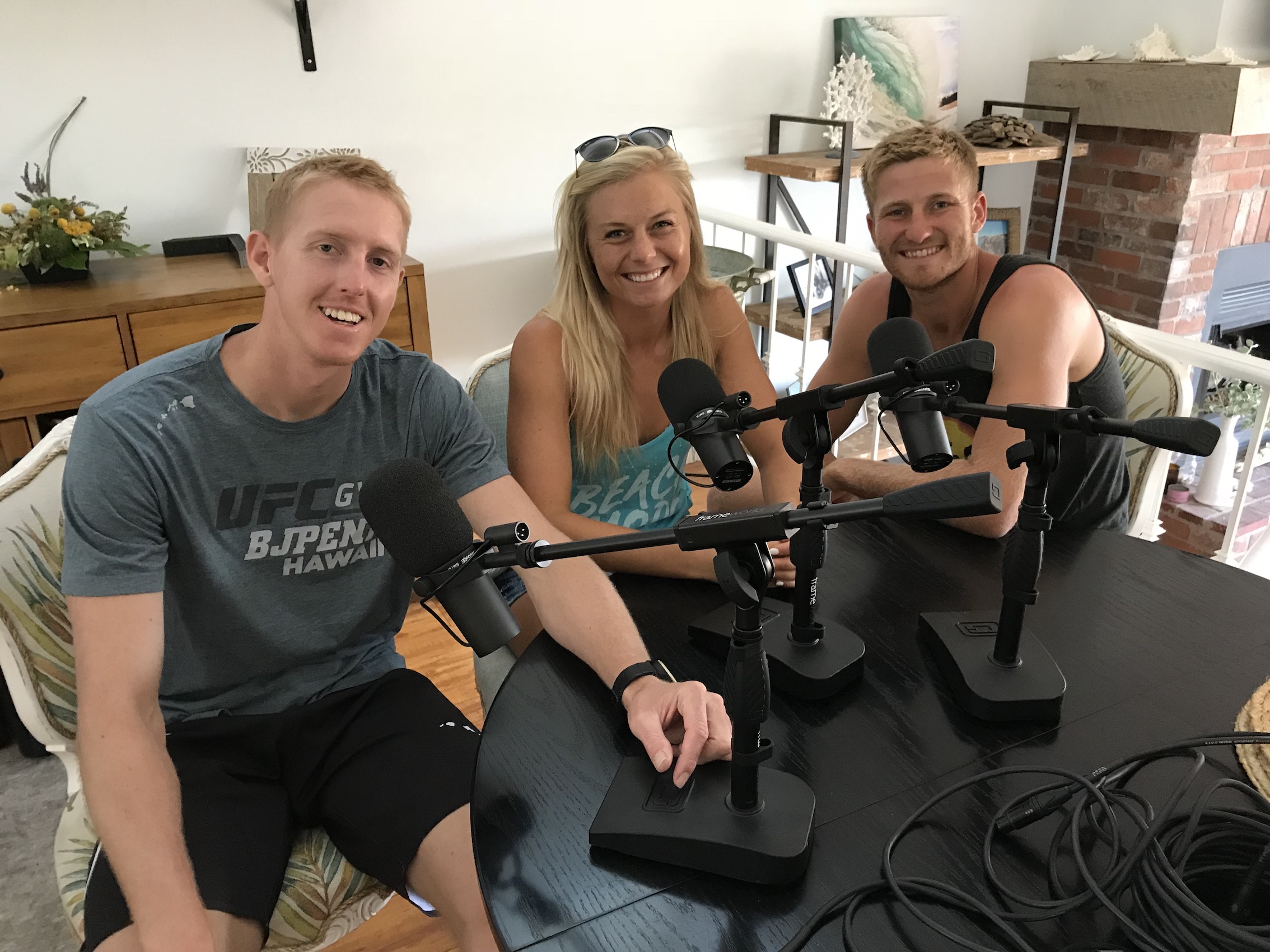
Wednesday Jun 27, 2018
Nicolette Martin: Just keep playing
Wednesday Jun 27, 2018
Wednesday Jun 27, 2018
It’s just after 6 a.m. on June 23, and Nicolette Martin leans into her seat at the Seattle-Tacoma Airport, a massive cup of coffee in hand, exhausted from both an early morning travel-day wake up and seven matches in the past three days at AVP Seattle.
Her voice is gone, as it should be, for it was hardly 12 hours ago that she was battling in a white-knuckler of a three-set quarterfinal match against Amanda Dowdy and Irene Hester-Pollock. Up 13-12 in the third set, Martin and Allie Wheeler couldn’t hang on, their legs finally giving way to 18, seven of which came during Thursday’s qualifier.
She doesn’t mind the qualifiers. They’re good to build a rhythm and get live reps before the main draw, but it would be nice, she admits, not to have those extra three matches, to not be so worn down by the quarterfinals.
Seattle marked the second time in as many tournaments that Martin made the quarterfinals after coming out of the qualifier. She did the same in Austin with Sarah Day, succumbing in the quarters to Katie Spieler and Karissa Cook.
An hour prior to the quarterfinal match, Spieler couldn’t believe that Martin and Day had already begun warming up. Hadn’t they already played 15 sets that weekend? In heat that had regularly eclipsed triple-digits?
How were they still going?
Just Nicolette being Nicolette.
To catch Martin in the airport is to catch her on the strangest of days: A day off. No volleyball. No reps. No working out. Just coffee and naps.
“I don’t know where that came from,” she said of her nonstop motor. “Just being at [USC], they really pushed us. We were training six days a week and Sunday was our rest day. It was an hour lifting then a three-hour practice. Doing that for four years, it’s like ‘Ok, we won three national championships. Something about that worked, so I need to keep going, I can’t stop.’”
It is that type of work ethic – or play ethic, really – that has enabled Martin to steadily climb the ranks of the AVP, from making one of three main draws in 2016, to six of seven in 2017 with a best finish of seventh, to two for two in 2018 with consecutive fifths.
“We started in Huntington and did awful,” Martin said, laughing. “We got a wild card into the main draw and went 0-2. The two games we played went to three and we lost both of those, so I think we used that as our fuel for our fire for Austin, so we went into Austin and yeah, we took a fifth.
“I think behind all of that, we’ve been working with our coach and we’ve been super open with each other and talking about our goals and how we’re feeling. We would just talk about things, where we’re at with our bodies, what we can give each other today, learning to talk to my partner more and being super open and honest and really trusting your partner and knowing they’re going to give 100 percent made me more free with my volleyball.”
And free, it seems, no matter who she’s playing with, whether it be Sarah Day, with whom she took a fifth in Austin, or Allie Wheeler, her former teammate at USC with whom she took a fifth in Seattle.
It would be difficult to miss the joy with which Martin plays. She’s constantly talking, cheering, yelling, smiling, laughing – something is coming out of her mouth. Sometimes it’s a joke, as it was when she found herself down 11-9 in the third set of the second round of the qualifier.
Sometimes she’ll ask her partner what she wants to dinner, “just to put your mind somewhere else for a second,” Martin said. “Like, ‘Ok, relax.’”
Whatever works.
At the moment, that seems to be mostly everything for Martin.
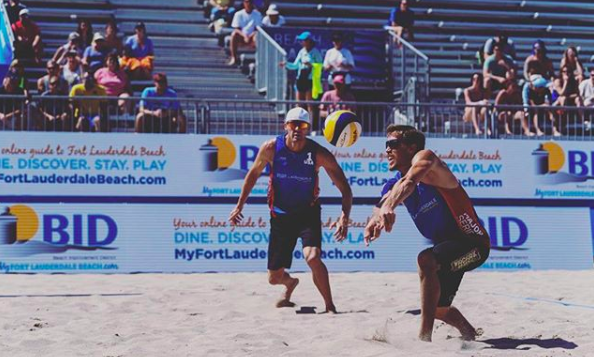
Wednesday Jun 06, 2018
Taylor Crabb just keeps playing -- and just keeps winning
Wednesday Jun 06, 2018
Wednesday Jun 06, 2018
There stood Taylor Crabb, arms raised, trophy in hand, smiling for cameras. A familiar pose that’s becoming quite regular for Crabb. It doesn’t matter if he’s on the left side or the right, with Jake Gibb or Tim Bomgren or Chase Budinger – Crabb can and will win with whomever he’s sharing the court, wherever the court may be.
Outrigger Canoe Club? He can win there, as he did on myriad occasions, with myriad partners, as a youth.
New York City? Yeah, he can win there too, alongside Gibb. It’s the site of his first AVP victory, and could very well be the site of his third by the end of this weekend.
Austin? He can push it to the finals there as well. Despite Gibb being injured. Despite only one day of practice with Tim Bomgren. Despite Bomgren playing on a sprained ankle that by the following Monday morning it would resemble a purple and blue softball more than it did an ankle.
Laguna Beach? In a tournament he never intended on playing? With a partner, Budinger, he’d never played with? Not even a practice? On a side he hadn’t played in more than a year?
He’ll take that $4,000 winner’s check, thank you very much.
This is what Crabb does. Not necessarily the winning, though he does that plenty.
He just plays.
He plays everything. Always has. Likely always will. Nothing at the moment seems to indicate otherwise, anyway.
“I’m pretty good at listening to my body,” he said, before admitting that “I do have injuries, but I do try to stay on top of them, one being my shoulder. A lot of rehab for my shoulder. Just keeping it strong helps a ton.
“Honestly, I’m sure you know, this is only my third year on the beach so far. Your first three years coming from indoor – the sand felt so good. Your body is way better. Right now, that’s where I am: 26, off the hard court, feeling good, diving around in the sand, nothing is going to hurt me.”
He’s feeling so good, in fact, that his coaches – Rich Lambourne and Tyler Hildebrand – have to order him not to practice. And even then, he still hops in for a drill or two, because there’s a new defensive position to learn, more reps to get, more playing to do.
He’s done this his whole life.
Doesn’t matter if it’s an impromptu dunk contest on the outdoor hoops across the street as a kid. Or basketball. Or soccer. Or living room volleyball. Or local tournaments that he’d win as a teen, “and I think everybody hated us,” he said, laughing. “All these 14, 15, 16-year-old kids winning all the tournaments.”
But when you look at those kids now, it’s easy to understand why most victories went their way.
There’s Trevor Crabb, winner of two FIVBs this year, and Tri Bourne, once ranked No. 2 in the world in 2016. There’s Spencer McLaughlin and Brad Lawson, two of the top-rated recruits from their respective high school classes. There is the Beard Brothers before they became the Beard Brothers. There is Micah Christensen, who is arguably the best setter in the world, and the Shoji brothers, Erik and Kawika, Olympians both.
And Taylor. Once the runt of the litter, so small that his aunt called him “Bug,” Taylor has since established himself as perhaps the best of the bunch, discussed among the top beach defenders in the country despite only being in his third year playing beach volleyball professionally. He whiffed in New Orleans of 2015, qualified for the next two – and then took a third in Manhattan Beach with Trevor.
Since then? He’s been in six finals and another six semifinals, with wins in New York and Hermosa Beach.
“I have goals in life,” he said. “And not one of those goal is to be better than someone. The short-term goal is to defend my title in New York. That’s No. 1 right now.”
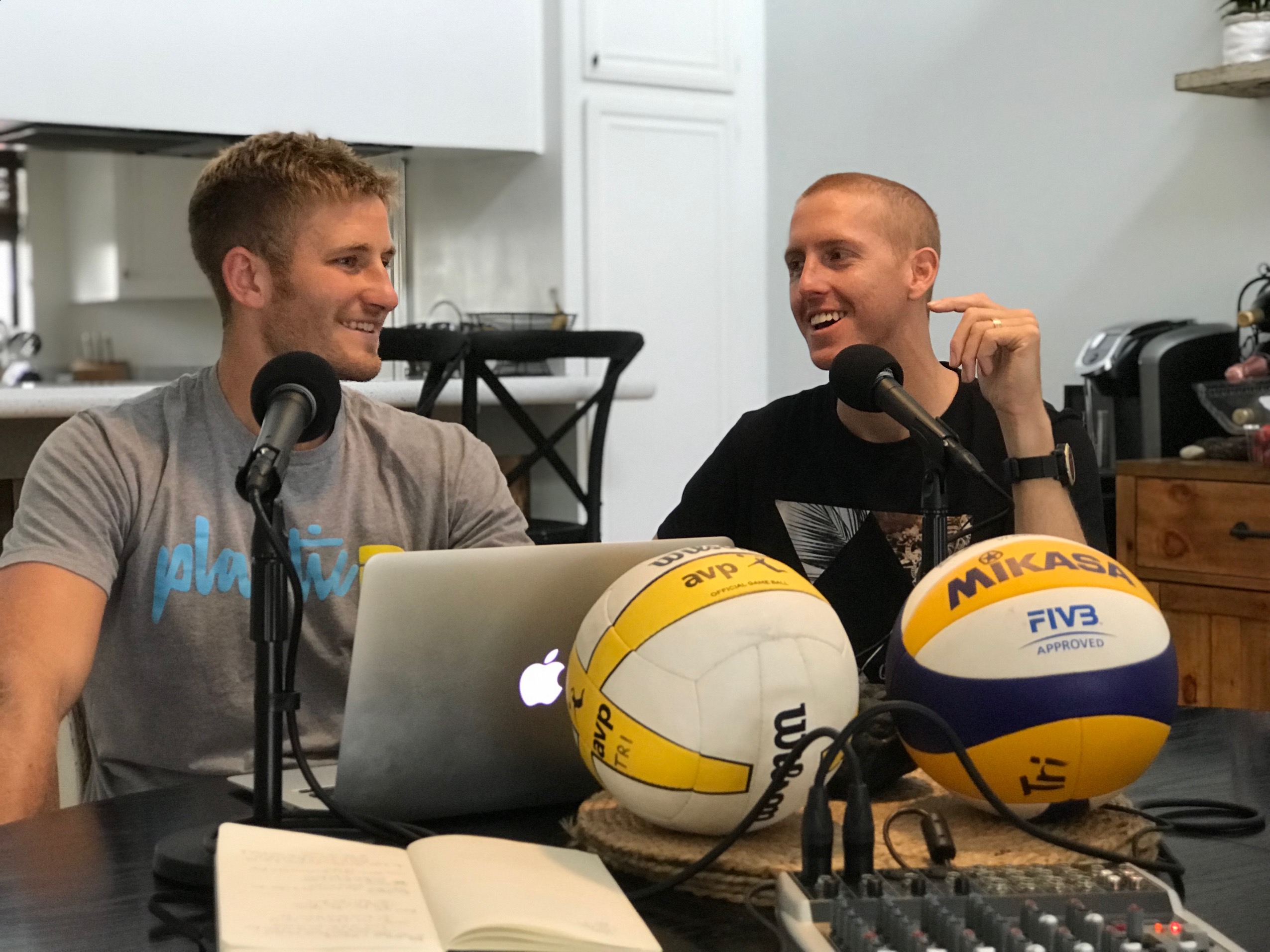
Monday May 28, 2018
Mailbag No. 2: Who's the best U.S. player not named Phil?
Monday May 28, 2018
Monday May 28, 2018
The mailbag is back!
On the second SANDCAST mailbag, Tri Bourne and Travis Mewhirter, alongside Podcast Mama Gabby Bourne, answer a wide variety of questions from you, the listeners. Before we get into the questions, a way to reach out to SANDCAST. If you have any questions, feedback, tips or suggestions, email us at sandcastpodcast@gmail.com.
Thanks to all who sent in questions for this week!
We answer one of the most oft-wondered questions in American beach volleyball: Aside from Phil Dalhausser, who has been the best American male in the past decade? Jake Gibb? Sean Rosenthal? John Hyden? Nick Lucena.
- The AVP has stopped at Madison Square Garden and played in front of a sold out crowd. If you had to pick one venue or site to play a tournament, where would it be? Both hosts, shockingly enough, may have biased answers based on hometowns and rooting interests.
- The United States, when compared to countries like Brazil, Poland, and Norway, among a number of others, is woefully behind in the development of young male talent. What's being done to produce higher-level talent at a younger age for the men?
- Finally, beach volleyball is slow to the game in terms of statistical and tangible analysis and breakdowns. Is that a direction the game is going, and if so, how?
If you like us, let us know and subscribe give a review on iTunes!
Follow us on Podbean to catch up with all episodes!
If you’re digging what we’re wearing, go ahead and give our sponsors some love at Plastic Clothing!
If you’re looking for some new board shorts or bikinis, check out Rox and their 80 PERCENT OFF SALE!
Popular on SANDCAST:
SANDCAST 20: Brotherly love with Maddison McKibbin
SANDCAST 17: Is p1440 the next big thing in beach volleyball?
SANDCAST 13: Sara Hughes embraces new responsibility: Role model
SANDCAST 12: Talking’ sh** with Trevor Crabb
SANDCAST No. 9: Chase Frishman and the AVP’s next wave of talent
SANDCAST 8: Phil Dalhausser has another mountain to climb
SANDCAST 6: A glimpse into greatness with April Ross, Part 2
SANDCAST 5: A glimpse into greatness with April Ross, Part 1
SANDCAST 3: It’s finally (finally) video game season for Kelly Claes
SANDCAST 1: The new Tri Bourne: Buddha Tri Bourne
Recover the right way with Firefly: Accelerated Athletic Recovery
Choose the ball the pros use. Choose Wilson, and use our 20 PERCENT DISCOUNT CODE: WILSONSAND!
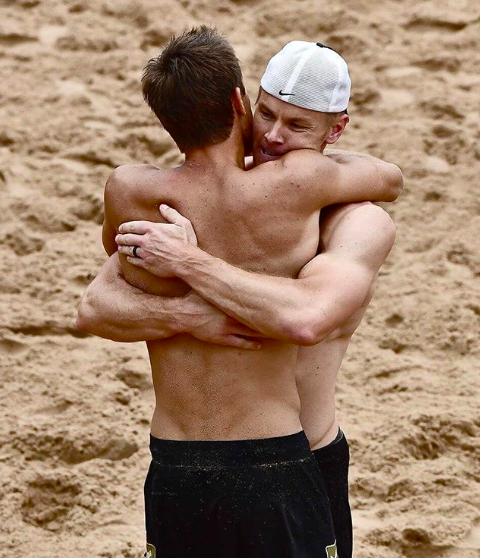
Wednesday May 23, 2018
Tim Bomgren, from Minnesota to the finals of AVP Austin
Wednesday May 23, 2018
Wednesday May 23, 2018
One day.
That’s it. That’s all Tim Bomgren and Taylor Crabb had for practice prior to AVP Austin. Crabb needed an emergency fill-in after Jake Gibb broke his toe. To the lefty from Minnesota he turned, despite never having played with Bomgren before, despite never having played with a lefty before.
Not that any of this is unusual for Bomgren.
He lives in Minnesota yet is one of the best blockers in the country. While many in Southern California are training four or five days a week in April, sometimes using sand socks because it’s too hot, Bomgren is shoveling snow, sometimes using sand socks because it’s too cold. The only other time Bomgren had made an AVP semifinal was in New Orleans of 2015, in which he and his brother, Brian, practiced for maybe two weeks prior.
One day?
Sounds about right.
“We talked about blocking calls and all that, we talked about who’s taking middle, who’s making the call when someone’s serving,” Bomgren said. “Taylor and Jake run a push to the outside – high, middle, low. Most teams do the same thing and I do the same thing with Brian. We talked about what his calls are, what my calls are and where to err.
“I prefer the ball to be further inside than outside and Taylor’s the same way. Talking those things out makes a huge difference in how the game flows.”
Indeed.
Whatever adjustments Bomgren and Crabb made, they worked. In a 16-team draw that featured a fully-loaded field, in which the only absent American was the one for whom Bomgren filled in, they made the finals.
Every team on their road to the finals had made at least the semifinals in the past year.
“It was extremely difficult,” Bomgren said. “I personally had to take myself out of the play, just kind of take it step by step, and I’m not trying to look at ‘I need to win three more matches today.’ It’s ‘I need to pass this ball, where it needs to be, so Taylor can set me.’ It was breaking it down for me, when we’re serving and receiving, taking it step by step and doing what you can, seeing how the plays turn out.”
Most turned out quite well. Some didn’t.
They lost their second match, against Ryan Doherty and Billy Allen, a match in which Bomgren sprained his ankle, though he made sure to note on SANDCAST that the sprain was not the reason they lost. Allen and Doherty played better.
That was it.
“In the first game, we controlled the match, we controlled our side of the net, and what happened was game two and game three we had a slow start, and that was largely due to what we did on our side of the net,” Bomgren said. “They were things we can control. So we tried to refocus that, and credit to Billy and Ryan, they played phenomenal volleyball. They ended up controlling the last two games and, ultimately, the match.
“We tried to refocus and we kept things simple on our side. Control our side of the net, do what we can do, and not do too much.”
And in not doing too much, ironically, Bomgren, on a bum ankle, with a partner he had never played with, after just a week or so of touching a ball, in heat that is entirely foreign to his native Minnesota, did more than he ever has on the AVP Tour. He and Crabb won their next four matches, including the always-alluring Crabb on Crabb quarterfinal matchup, including a three-set, nearly two-hour grinder in a rain-soaked semifinal against Reid Priddy and Jeremy Casebeer.
Just Tim being Tim.
“I think I played once and had four drilling sessions,” he said of his preparation, laughing. “Brian and I are both the type of players, and we’re very gracious for it, but we’re not the type of players who need 1,000 reps a day to stay fresh and stay on top of our game. We kind of pick it up as we go.
“Ultimately, what it comes down to, you get into that game situation, especially on the AVP Tour, and it doesn’t matter. If you’re focused, you know what you’ve been practicing, you know what you’ve been doing. Once I’m focused, and I’m into the game, I’ve done it 1,000 times. Once you get into that game mindset, everything comes back to you.”
All the way from Minnesota to the finals.
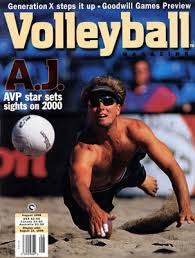
Wednesday May 16, 2018
Adam Johnson: The Hall of Famer hiding in plain sight
Wednesday May 16, 2018
Wednesday May 16, 2018
Adam Johnson couldn’t believe it.
He’d had some rough losses in his day, narrow losses with a lot on the line. Twice he had been the first team out of the Olympics, and twice it was because of a random, head-scratching injury. In 1996, when Johnson was partnered with Randy Stoklos in the Olympic trials in Baltimore, the two had to win just one of their next two matches, the first of which would come against the Mikes – Mike Whitmarsh and Mike Dodd.
Thirty seconds before the match, Stoklos hit one final warm up jump serve, landed on a ball and sprained his ankle.
Johnson and Stoklos would lose the next two matches, and their bid for the Olympic Games.
Four years later, it was Johnson and Karch Kiraly, needing essentially only to qualify for one final tournament to seal their spot in the Athens Games – and then it was Kiraly who suffered an injury.
Again, Johnson was the first team out.
“Thanks for reminding me,” he said, wistfully, on SANDCAST: Beach Volleyball with Tri Bourne and Travis Mewhirter.
Eighteen years have passed since just missing out on the 2000 Games, but stakes are still high for Johnson on the volleyball court.
Now, he’s wagering In N Out burgers.
“I’ve never lost to my girls,” he said. “Now I will say that with a little asterisk, because I am getting a little bit older, and I was up 22-10 when one of the girls shot the ball over on one and I turned to go get it and I heard my hammy go a little bit.”
Johnson wanted to call it quits.
The girls wouldn’t have it.
He made a bet: Loser takes the winner out to In N Out.
“They wanted to know when we were going,” he said, laughing. “I’m here going ‘I’m up 22-10, and you’re telling me you’re not giving me another shot?’ And they’re like ‘Well can you go right now? Or you forfeit.’ They are pretty ruthless.”
A competitive edge, perhaps, gleaned from their coach.
This was a man who, in his first full season on the beach after years playing on the indoor national team and overseas in Italy, won five tournaments and labeled that as being “kicked around.”
From 1994-1999, Johnson, playing with an armada of partners who would cement themselves as some of the best in the game – Jose Loiola, Kent Steffes, Kiraly, Tim Hovland, Stoklos – won at least four tournaments per season, in fields that were stacked with one Hall of Famer after the next.
That drive is still there.
“I don’t know if I ever gave up on being a player,” said Johnson, who retired in 2000, made a brief reemergence in 2005, before retiring again. “I’m always still trying to get up a ball up on my girls who can’t get it up, just using my foot or putting it back in play if it’s over the bench or something.
“I love coaching. I feel like I have a lot to offer. If they ask questions and want to learn, I feel like they can get better.”
Perhaps even more important: They might be able to get some In N Out.